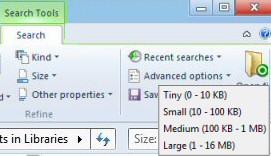Windows 8 Search for Files
Here are techniques for mastering the ‘Search Results’ box in Windows 8, and thus finding your files more easily.
- Searching for Windows 8 Files
- Windows 8 Advanced Query Syntax
- Windows 8 Search Dialog Box
- Windows 8 Indexing Options
- Windows 8 Search Keyboard Shortcuts
- Windows 8 File Keyboard Shortcuts
♦
Searching for Windows 8 Files
This page deals with hunting for pictures, music files or office documents stored on your computer by using the Windows Explorer. Please note that Windows 8 supplies a separate dialog box to search for Windows 8 Apps.
Explorer Ribbon: Search Tools
Assuming you have launched the Windows Explorer, as soon as you click on ‘Search Libraries’ the Ribbon tab changes to highlight ‘Search Tools’.
In this pair of screenshots we see the context sensitive tab on the Windows 8 Ribbon switch from ‘Home’ and ‘Search Libraries‘ (above) to ‘Search Tools’ and ‘Size:>10mb’ (below). See more on Windows 8 Libraries.
You could use the mouse to click on the sub-menus, ‘Kind’, ‘Size’ or ‘Date Modified’ (see above). Alternatively, you could master the AQS syntax and type search commands in box to the right.
Windows 8 Advanced Query Syntax (AQS)
I have to confess that it was only after I had used Windows 7 for two years that Paul DeBrino directed me to these AQS aids for seeking files. It’s not going to take me as long to use this query syntax in Windows 8!
Boolean Operators
The key to mastering these techniques is to type the operator in UPPER case. Windows Explorer’s trawls through the contents of files and applies its logic to the words on either side of the Boolean operator, for example:
- OR e.g. Article OR News.
- AND e.g. Jackson AND Singer Also you could use parentheses (Jackson Singer).
- NOT e.g. Books NOT Pictures. Alternatively: Books -Pictures
- Also remember the old faithful * wildcard, especially if you trying to find a special character such as à.
If you still cannot get the precise search result you want then I suggest you try parallel techniques, such as the built-in finstr, or better still, PowerShell’s Get-Content.
Guy Recommends: A Free Trial of the Network Performance Monitor (NPM) v11.5
v11.5
SolarWinds’ Orion performance monitor will help you discover what’s happening on your network. This utility will also guide you through troubleshooting; the dashboard will indicate whether the root cause is a broken link, faulty equipment or resource overload.
What I like best is the way NPM suggests solutions to network problems. Its also has the ability to monitor the health of individual VMware virtual machines. If you are interested in troubleshooting, and creating network maps, then I recommend that you try NPM now.
Download a free trial of Solarwinds’ Network Performance Monitor
More Techniques for Searching for Windows 8 Files
Search for Large or Small Files
Get into the rhythm of the syntax, Keyword colon operator.
- Size:>10mb Greater than 10 megabytes.
- Size:<1mb Smaller than 1 megabyte
- Once you type ‘Size:’ observe a context sensitive menu featuring Tiny, Medium and Large files.
Windows 8 Search for File Extensions
If you know the file extension then type the keyword ‘Ext’ in the Windows explore search box. The rhythm is: Ext colon followed by a period, then the letters of your file extension. The good news is that Windows Explorer’s autocomplete and autocorrect will guide you to finding the correct files.
- Ext:.doc
- Ext:.txt
- Additionally, you could also apply a Boolean operator Ext:.doc OR Ext:.txt
Search Using a Date Filter
Note the singular ‘date’, followed directly by the colon, however, there is a space between the two keywords. Here are examples:
- Date:Last month
- Date:This week
- Date:Next year
If you are trying to find a photograph try this:
Datetaken:January
Kind of File
When I was looking for text documents in different formats, I stumbled across this option to search for file types:
The keyword is Kind: (Remember that colon:)
Search By Authors
There are other keywords such as Authors that you could use for searching through files in mixed folders.
Author:="Guy Thomas"
Remember the Old Faithful Wildcards *?
I almost forgot, sometimes using the old * wildcard, or ? for a single character is the quickest way to find your file.
Windows 8 Save Search
 If you regularly search for a particular file pattern consider saving your search. Another alternative is to check the Recent searches, see screenshot above.
If you regularly search for a particular file pattern consider saving your search. Another alternative is to check the Recent searches, see screenshot above.
Talking of Windows Explorer Ribbon, from the ‘File’ menu you can also ‘Change folder and search options’. See screenshot to the left. What this offers in addition to tweaking the search locations, is the ability to show hidden files, folders and drives. See more on the Windows 8 Ribbon.
SolarWinds Firewall Browser 
Here is an utility where you can review firewall settings such as access control lists (ACL), or troubleshoot problems with network address translation (NAT).
Other reasons to download this SolarWinds Firewall Browser include managing requests to change your firewall settings, testing firewall rules before you go live, and querying settings with the browser’s powerful search options.
Guy recommends that you download a copy of the SolarWinds free Firewall Browser.
Windows 8 Search Dialog Box
Please note that Windows 8’s search has separate controls and logic from Windows Explorer. The default behaviour is to search for Apps, but you can also search for Settings and Files. Research shows most people are looking for an app or an executable rather than a file. This is why Windows 8’s Metro responds with the dialog box on the right when you start typing at the main menu.
Windows 8 Indexing Options
If you call for the Windows 8 Settings (WinKey +w) then type index, you will see the ‘Indexing Options’ icon. Launch the interface and adjust what Windows 8 should index. I agree with other experts who say ‘don’t index the operating system files in the Windows folder’, but I would advise indexing the locations of your other text or document files.
Keep an Open Mind – Indexing Advice
I ask you to keep an open mind on how much to index and to experiment with both the locations and ‘Index Properties and File Contents‘ – see screenshot below. To investigate the consumption of resources, launch the task manager and look amongst the ‘Background processes’ for Microsoft Windows Search Indexer. I would only start removing folders (or File Contents) from indexing if you observe the CPU usage above 50% for more than a minute. See more on Windows 8 Indexing Options.
Indexing tip: If you have more than one disk, move the index file location to that second hard drive. To check your location options, click on the ‘Advanced’ button, see above screenshot.
Indexing Service. This is employs the same underlying engine as Search, thus you will find it listed in the Windows Services under ‘Windows Search’
The Windows 8 Experience Index. This is a completely different feature, it tells you which component is the weak link in your hardware specification. Incidentally, the WEI tells me that I should get a better graphics card to make the most of the Win 8 operating system.
Windows 8 File Keyboard Shortcuts
Here are Windows 8 keyboard combinations to access file and application search dialog boxes quickly. Naturally, each combination begins with the Windows key, which is next to the Ctrl.
WinKey +e This classic keyboard combo launches the Windows Explorer.
WinKey +f Here is a keyboard combination to start a file search.![]()
WinKey +c Displays the Windows Charms, but other combinations shown here are faster if you want to Search.
WinKey By itself toggles between the Start screen and the Windows Desktop, or the foremost running Metro app.
See more WinKey keyboard combinations.
Summary of Windows 8 File Search
Searching for Windows 8 files is quicker and faster than ever, especially if you take full advantage of Indexing. For more complex file searches in Windows Explorer, do take the time to click on the Search Tools in the ribbon, alternatively you could learn the Advanced Query Syntax (AQS).
If you like this page then please share it with your friends
Microsoft Windows 8 File Topics
• Windows 8 Overview • Windows 8 Explorer Ribbon • Windows 8 Indexing • Windows 8 ReFS
• Windows 8 Libraries • Windows 8 AppData Folder • Win 8 Explorer Ribbon • Windows 8 Search
• Windows 8 Task Manager • Windows 8 Search Files • Permissions Analyzer • Windows 8 Partitions







